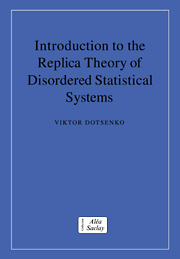Book contents
- Frontmatter
- Contents
- Preface
- 1 Introduction
- Part one Spin-glass systems
- Part two Critical phenomena and quenched disorder
- 7 Scaling theory of the critical phenomena
- 8 Critical phenomena in systems with disorder
- 9 Spin-glass effects in the critical phenomena
- 10 Two-dimensional Ising model with disorder
- Part three Other types of disordered system
- Bibliography
- Index
8 - Critical phenomena in systems with disorder
Published online by Cambridge University Press: 08 September 2009
- Frontmatter
- Contents
- Preface
- 1 Introduction
- Part one Spin-glass systems
- Part two Critical phenomena and quenched disorder
- 7 Scaling theory of the critical phenomena
- 8 Critical phenomena in systems with disorder
- 9 Spin-glass effects in the critical phenomena
- 10 Two-dimensional Ising model with disorder
- Part three Other types of disordered system
- Bibliography
- Index
Summary
Harris criterion
In studies of the phase-transition phenomena, the systems considered before were assumed to be perfectly homogeneous. In real physical systems, however, some defects or impurities are always present. Therefore, it is natural to consider what effect impurities might have on the phase-transition phenomena. As we have seen in the previous chapter, the thermodynamics of the second-order phase transition is dominated by large-scale fluctuations. The dominant scale, or the correlation length, Rc ∼ |T/TC – l|–v grows as T approaches the critical temperature Tc, where it becomes infinite. The large-scale fluctuations lead to singularities in the thermodynamical functions as |τ| ≡ |T/Tc – 1| → 0. These singularities are the main subject of the theory.
If the concentration of impurities is small, their effect on the critical behavior remains negligible so long as Rc is not too large, i.e. for T not too close to Tc. In this regime the critical behavior will be essentially the same as in the perfect system. However, as |τ| → 0 (T → Tc) and Rc becomes larger than the average distance between impurities, their influence can become crucial.
As Tc is approached the following change of length scale takes place. First, the correlation length of the fluctuations becomes much larger than the lattice spacing, and the system ‘forgets’ about the lattice. The only relevant scale that remains in the system in this regime is the correlation length Rc(τ).
- Type
- Chapter
- Information
- Publisher: Cambridge University PressPrint publication year: 2000



